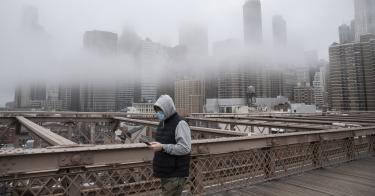The first wave of COVID-19-related product liability and other tort litigation has already hit U.S. courts, but a much bigger surge will come when the country reopens. That next wave of lawsuits will allege companies have been using “unreasonable” anti-pandemic measures to protect the public.
Congress moved to head off similar litigation outbreaks after 9/11, and it is time to do so again. More specifically, Congress should merge elements of the existing liability-protection programs into a new law aimed at dramatically reducing the expected wave of nuisance lawsuits.
The first law Congress should borrow from is the Support Anti-Terrorism by Fostering Effective Technology Act of 2002, better known as the “SAFETY Act.” The SAFETY Act offers liability protections—either a cap on litigation damages or a dismissal of the lawsuit—to companies that deploy programs, services, and tools to protect against terrorist attacks. The liability protections are available to companies that have asked the government to review their anti-terrorism measures to determine whether they are effective.
The other law Congress should look to is the Public Readiness and Emergency Preparedness or “PREP” Act. It automatically bars most types of lawsuits for drugs and devices regulated by the Food and Drug Administration or specifically named by Congress.
Both laws have proved extremely helpful. Unfortunately, they don’t address the crippling effects posed by potential litigation accusing most businesses of “negligently” reopening in the wake of the COVID-19 pandemic. The SAFETY Act, for instance, only applies when there has been an “act of terrorism,” which is obviously not the case with the coronavirus.
The PREP Act, meanwhile, does not apply to the drafting and implementation of needed anti-pandemic policies, such as disinfecting processes or social distancing measures that are vital to keeping infection rates down.
Congress needs to create a new program to address those liability gaps. The SAFETY Act is designed to cover lawsuits unaddressed by the PREP Act. Lawmakers would do well to use the SAFETY Act as a template, and merge in some of the litigation reforms offered by the PREP Act.
This new law—let’s call it the Pandemic SAFETY Act—should require dismissal of claims alleging negligent implementation of pandemic mitigation or response measures, medical malpractice claims where the PREP Act does not apply, as well as product liability claims over the development or sale of anti-pandemic tools not covered by the PREP Act.
Businesses could obtain those protections either by applying for them proactively through a SAFETY Act-like government review process, or by demonstrating to a judge that they had implemented reasonable pandemic control and mitigation policies and procedures, including those recommended by federal and state authorities at the time of the alleged injury.
In either situation, the protections would be nullified if a court found a business guilty of committing fraud or willful misconduct when implementing its pandemic mitigation plans.
It is important that the pandemic SAFETY law cover all businesses, whether for profit or not, and whether big or small. It will be particularly important to protect small businesses, as they are the backbone of the American economy and are particularly susceptible to opportunistic tort lawyers.
History has shown that just the threat of lawsuits by aggressive tort lawyers can easily derail critical recovery efforts. Congress should work to establish effective and appropriate liability limits to keep that from happening.
Modifying and expanding existing statutes can limit liability in ways that forestall frivolous tort lawsuits and encourage widespread application of effective pandemic mitigation and recovery policies. If Congress does this, it will help protect public health and prevent unscrupulous lawyers from needlessly hindering the economic recovery Americans so desperately need.
This piece originally appeared in The Washington Times



